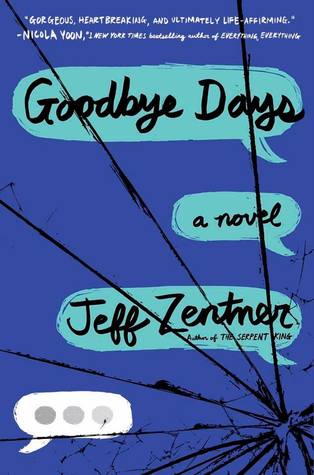 Goodbye Days by Jeff Zentner is another one of the inaugural batch of YA titles recently added to the Blogging For Books program. So, when I read several blurbs likening it to Looking For Alaska (which I loved), I thought I must request a free copy of this book for the purpose of review. I haven't read Zentner's first novel, The Serpent King, but now that I've finished Goodbye Days, it definitely holds a place on my TBR list. Before I get into why Goodbye Days turned Zentner into a must-read author for me, can we talk about its artful cover design for a second? I love the simplicity of the color palette, the word bubbles' resemblance to a text convo, and the textured web debossed into the cover, meant to signify a shattered windshield. I don't think this cover could be more apropos for the story, or more pleasingly elegant in its simplicity.
Goodbye Days by Jeff Zentner is another one of the inaugural batch of YA titles recently added to the Blogging For Books program. So, when I read several blurbs likening it to Looking For Alaska (which I loved), I thought I must request a free copy of this book for the purpose of review. I haven't read Zentner's first novel, The Serpent King, but now that I've finished Goodbye Days, it definitely holds a place on my TBR list. Before I get into why Goodbye Days turned Zentner into a must-read author for me, can we talk about its artful cover design for a second? I love the simplicity of the color palette, the word bubbles' resemblance to a text convo, and the textured web debossed into the cover, meant to signify a shattered windshield. I don't think this cover could be more apropos for the story, or more pleasingly elegant in its simplicity.Goodbye Days tells the story of Carver Briggs, the only remaining member of a friend group of four guys who jokingly called themselves The Sauce Crew. The book opens in the wake of the deaths of Mars, Eli, and Blake--Carver's friends who perished in a car crash when Mars took his eyes off of the road while behind the wheel to answer a text from Carver. While dealing with his own grief, loss, and guilt in the aftermath of the accident, Carver begins experiencing panic attacks, and the book chronicles his sessions with an amazing therapist.
Goodbye Days tackles a multitude of complex issues with aplomb. From wrestling with the question of who is at fault, both legally and morally, for the accident to addressing that oft uncomfortable verbal space between parents and their teenage sons and daughters, Zentner does not shy away from tough queries--even if he doesn't have answers for them at the ready. Goodbye Days prominently features issues of mental health in a way that is productive, empathetic, and realistic. It features a young female character who is Filipino and has Caucasian adoptive parents, empowering her to frequently call out comments and actions that may be sexist or racist in a way that is neither condemning of the speaker, nor allowing herself to become a doormat. It also highlights a dysfunctional father/son relationship between a high-achieving Black Judge and his son, the parameters of which have been set by the ultra-strict father, based upon his own personal struggles trying to get ahead in the world as a Black man. It features a gay character who dies closeted to a very loving relative because he worried that her religious beliefs wouldn't allow her to accept his identity, and it deals with this plotline with super sensitivity. It also chronicles severe child neglect and abuse, but somehow does not allow the book to get sidetracked by the disheartening images described.
All in all, I can see the reasons why people might compare Goodbye Days to Looking For Alaska, but I think comparison to any of Chris Crutcher's books would be more apt. Zentner's writing features the same emotional truth, appearance and clash of characters weighted down by eerily lifelike problems, and stark contrast of adults who couldn't be more helpful with those who couldn't be more harmful to the teen characters he introduces on the page. Just as with Crutcher's books, this is a winning combination--one that lends the power and verisimilitude that keep Goodbye Days from being preachy, overwrought, or smacking of condescension. Highly recommended for those who like YA that artfully balances humor with solemnity.
No comments:
Post a Comment